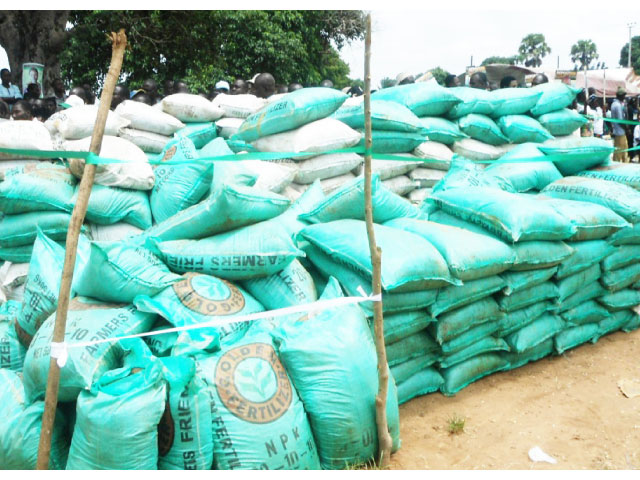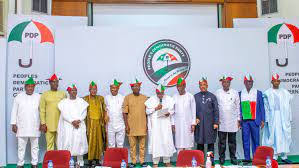Agriculture
Expert Says Banning More Imports Will Cripple Economy

By UdoOnyeka
President of the Shippers Association, Rev Jonathan Nicole has said that Nigerian ports would continue to suffer, just as the manufacturing industries have suffered, if the Federal Government decides to place ban on importation of certain goods items.
Rev Nicole who raised the concerns noted that already, the 41 items banned from accessing foreign exchange by the Central Bank of Nigeria has caused most industries to fold up.
According to him, the policy has had a ripple effect on most Nigerian Shippers, the port system has suffered tremendously and poor Nigerians have also suffered effect of these policies.
“If the government now places ban on some of the items that Industries need to produce, because most of the 42 items already on ban has to do with Industries, so if the government wants to place more items on ban, it means that the industries will suffer.
In fact, some of them are already packing up their load because they cannot even sell their goods,” he said.Further he said “I know one or two who found it difficult to import this year, their workforce is about 500 Nigerians, they work three shifts before, now they hardly do two shifts because they are reducing, and even then, reduction of overhead cost, the regular machineries they have to service, they have to buy diesel to fuel their generators and vehicles and other sundry expenses.
“With all these, the manufacturers cannot cope because there is no income, check through their warehouses, they are sealed up because they cannot sell their goods because there is no money in the country for citizens to buy goods,” Rev Nicole added.
“The Shippers Association boss asked how many of the factories will survive if the government places ban on some more items? It means that our port system will be empty” he said
Rev Nicol noted that most of the importers from the informal sector are still surviving because they source their foreign exchange by themselves because most of them are not valid for foreign exchange
He said most of them enjoy the ninety days payment schedule from the manufacturer who gives out the goods and collect money after ninety days.
The shipping expert was reacting to the latest import restriction announced last week when the Federal Government directed the Central Bank of Nigeria (CBN) to stop issuance of foreign exchange for food importation, so as to increase local production of food in the country.
It would also be recalled the CBN Governor, Godwin Emefiele, had also announced plans to put forex restriction on dairy products during the last Monetary Policy (MPC) meeting held on July 23 in Abuja.
| ReplyForward |
Agriculture
Epe LG Empowers 200 Farmers to Boost Food Production

Ms Surah Animashaun, the Chairperson, Epe Local Government, has empowered 200 farmers with cash and other agricultural inputs to boost food production in the area.
Animashaun distributed the agricultural inputs to the beneficiaries at the council secretariat in Epe on Thursday in Lagos.
She said the initiative was aimed at supporting farmers in order to boost food production in the various communities of the council.
Animashaun said the farmers who benefitted from the gesture are expected to be considerate in their price fixing after harvest to ensure the affordability of food for all Nigerians.
“With the economic situation now and the support being giving to you, farmers should be reasonable in fixing prices after harvest to ensure that ordinary Nigerians source food at a more convenient price nationwide.
“We are here to give you support for your farming activities today, we expect that you reciprocate tomorrow by selling at a more affordable price to the people tomorrow,’’ she said.
Animashaun explained that each of the benefiting farmers received N50,000 and essential grains such as maize and sorghum.
She said the council would continue to support the farmers for them to be strong in farming activities.
Animashaun also used the medium to highlight her administration’s ongoing efforts in the extension of palliatives to other sectors of the economy.
She urged the communities in the area to maintain harmony, love, hospitality, and compassion, particularly in the face of the present economic challenges.
Also speaking, Mr Sikiru Owolomoshe, the Vice Chairman of the council, urged the farmers to take advantage of the gesture to improve their activities in order to encourage others.
Mr Olayinka Kazeem, the Secretary of Epe Farmers and a beneficiary, expressed gratitude to the council chairperson and her management.
“This is the first time we are witnessing this kind of programme and it is coming at a critical period when many states are facing food shortage,’’ he said.
He assured that the beneficiaries would do their best to ensure the objective was achieved.
Mr Ahmed Surakat, the Public Relations Officer of Lagos State Fishermen Cooperative Association, and Mrs Kafilat Animashahun beneficiaries, extended their gratitude to the council chairman for her unwavering support to farmers.
Earlier, the President of the Epe Farmers Union, Mrs Aminat Shabi, lauded Animashaun for the comprehensive support to other agricultural value chain such as fish farmers and livestock producers.(NAN)
Agriculture
Food Security Achievable Through RAAMP, Says National Coordinator

By Tony Obiechina, Abuja
The Rural Access and Agricultural Marketing Project (RAAMP) has been described as an appropriate and very effective means of realising food sufficiency and security across the country.
The National Coordinator of RAAMP, Engr Aminu Bodinga Mohammed who made the assertion during the 7th Joint World Bank and French Development Agency Implementation Support Mission of RAAMP at the Shehu Musa Yar’Adua Centre, Abuja, pointing out that most urban centers derive their supply of food from farms, which are located at the rural communities.
His words: “the primary objective of RAAMP is to improve rural roads and trading infrastructure through to boost food production.
Therefore the successful implementation of this project could go a long way towards guaranteeing food sufficiency and security across the country”.He solicited for concerted efforts by all stakeholders to ensure an all-round success of the project.
Aminu noted that the mission was to evaluate the current implementation status, milestones as well as challenges faced by the 19 states participating in the project and announced that arrangements had reached an advanced stage for the commencement of civil works on agro-logistics centers (ALCs) latest by September, 2024 with 23 major contracts that would be awarded across the states.
ALCs refer to market hubs that have been prioritised for transformation to ultra-modern standards at various locations across the country , notably in rural communities to empower and enhance the livelihoods of the people.
Also speaking, the Task Team Leader of the World Bank, Mr. Rakeesh Tripathi hinted that a scale-up was being mooted for the project but emphasized that only states which must have established and operationalised the Rural Access Road Agency (RARA) and State Road Fund (SRF), backed up with the required standing on counterpart funds would be eligible to access the scale-up funds.
He therefore advised all states to take advantage of the mission and get the needed support to tackle every challenge facing their State Project Implementation Unit (SPIU), adding that all the 36 states and the Federal Capital Territory would be encouraged to embrace the scale-up project.
Highpoints of the exercise were presentations by the State Project Coordinators of the respective participating states, question and answer sessions, comments and observations, among other inputs by the stakeholders.
The Task Team Leader of the French Development Agency, AFD; Consultants from the World Bank; the Federal Project Management Unit, FPMU as well as State Project Implementation Units, SPIUs of RAAMP also attended the mission.
Agriculture
NCP Approves Repositioning of Agriculture Bank

By Tony Obiechina, Abuja
The National Council on Privatisation (NCP) has given its nod to the recommendations aimed at repositioning the Bank of Agriculture (BOA) to ensure food security for Nigerians.
Chaired by the Vice President, Sen. Kashim Shettima, the NCP approved the recommendations from the committee on BOA during its second meeting of 2024 held on Wednesday, April 24, 2024, at the Presidential Villa Abuja.
In his address at the meeting, the Vice President emphasized the importance of optimizing BOA as part of the administration’s agenda to provide food security for the nation.
He urged the committee to engage professionals with integrity to manage the process effectively.Presenting the committee’s report, the Minister of Finance and Coordinating Minister of the Economy, Mr. Wale Edun, who is also the Vice-chairman of the NCP, highlighted the decision to reposition BOA for efficiency and effectiveness. He expressed confidence that the recommendations would guide the Council in revitalizing the Bank of Agriculture and positioning it globally.
One of the Key recommendations includes upgrading the Bank’s ICT infrastructure to automate processes and ensure accountability.
Recall that in 2023, an 8-member inter-ministerial team was set up by the NCP to review the state of affairs at BOA, given its critical role in agriculture and the administration’s commitment to food security.
Additionally, in 2016, the NCP approved collaboration between the Bureau of Public Enterprises and the Federal Ministry of Agriculture and Rural Development, along with the Federal Ministry of Finance, to restructure and recapitalize BOA.
According to a statement by BPE Head of Public Communications, Amina Tukur Othman on Friday, the BOA, formerly known as Nigeria Agricultural Cooperative and Rural Development Bank, waa established in 1992.
It is owned by the Federal Government of Nigeria (FGN), with the Ministry of Finance Incorporated (MOFI) holding 60% and the Central Bank of Nigeria (CBN) holding 40%. The Bank is supervised by the Federal Ministry of Agriculture and Food Security (FMAFS).
























